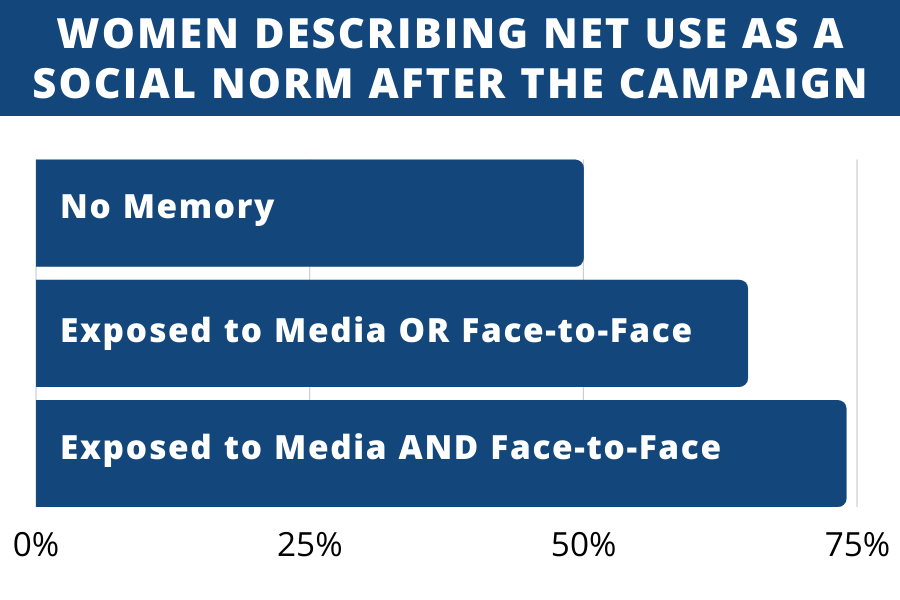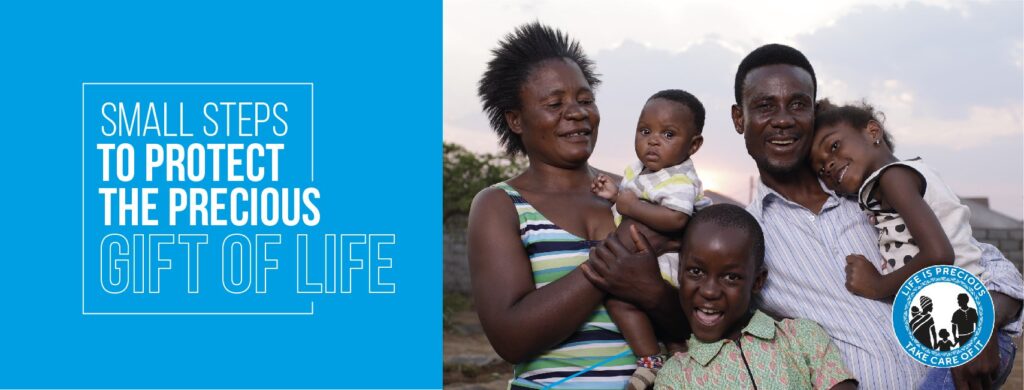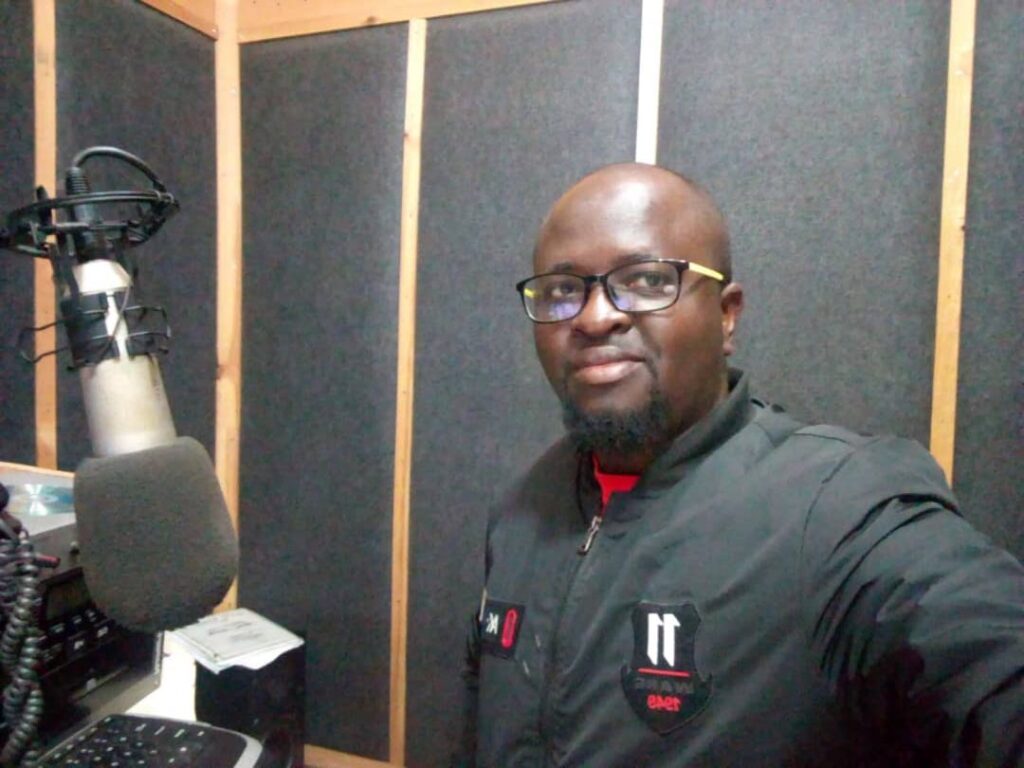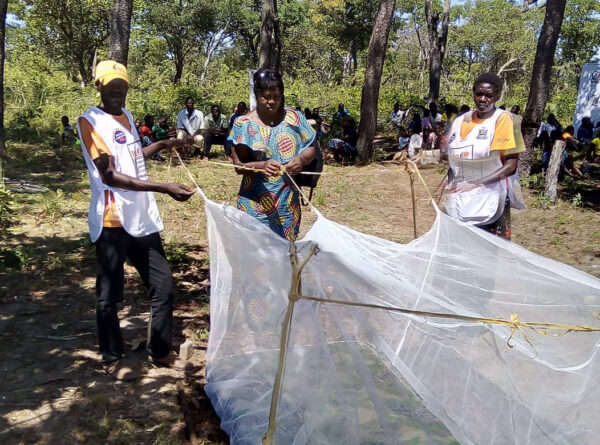Using a multichannel approach, Zambia’s “Life is Precious, Take Care of It” campaign improved malaria prevention and care-seeking behaviors
To improve the health and well-being of the Lala people in Central Zambia, Chief Shaibila promotes simple steps to living a good life, such as sleeping under a mosquito net, eating nutritious food, avoiding risky sexual relations, and consulting health providers when something is wrong. “Is it a big ask to enjoy good health? No. We all know life is a precious gift, and we need to take care of it,” said Chief Shaibila in a testimonial video that was shared on Facebook and through various WhatsApp groups to motivate others to adopt and promote healthy behavior.
Chief Shaibila was not the only one urging Zambians to complete simple steps to living a healthier life. Similar messages were everywhere during the “Life is Precious, Take Care of It” campaign, including on the radio, at roadshows, health centers, and community football games.
In support of the Government of the Republic of Zambia’s national vision of turning the country into a nation of healthy people by 2030, Breakthrough ACTION and the Zambia Ministry of Health launched the “Life is Precious, Take Care of It” social and behavior change campaign. Funded by the U.S. President’s Malaria Initiative and USAID, the campaign promoted simple steps to living a healthy life by creating an enabling environment for Zambians to adopt and maintain positive health behaviors to avoid malaria, malnutrition, and sexually transmitted infections.
The “Life is Precious” campaign took an all-encompassing, multi-method approach to surround communities with support and motivation for living a healthy life. This involved radio broadcasts, in-person community engagement activities, roadshows, print materials, social media, and a network of traditional and religious leaders who—like Chief Shaibila—advocated for simple, easily adoptable, healthy behaviors.
By creating synergies across media outlets and community activities, the campaign’s recognizable messages achieved widespread reach. Radio shows on malaria reached over 4.5 million listeners. Nearly 160 community wellness days, roadshows, and soccer tournaments brought hundreds of people together to learn about healthy living. In addition, over 2,000 health promotion officers, journalists, public health lecturers, non-governmental organization staff, and community volunteers were trained on speech writing, media handling and management, and social and behavior change concepts like human-centered design.
The campaign also included engaging traditional leaders and district health officials to produce seven malaria radio spots, which aired over 16,000 times in local languages across four provinces, and trained radio hosts on malaria. It aired phone-in shows and pre-recorded clips featuring traditional leaders and relatable characters to shift perceptions and promote healthy behaviors, such as sleeping under a mosquito net, seeking care for fever, and visiting the clinic as soon as you know you are pregnant to receive the first dose of preventive malaria medication.
Vincent Kapungwe, a radio station manager in Mansa district, commented, “The radio programs have also helped to raise awareness around the importance of malaria testing and treatment.”
Kapungwe said some residents have called in to talk about their experiences with health care providers who have prescribed malaria medication to patients without testing them first. “Now [patients] know that they have to be tested before they can take the medication.”
After listening to a radio program, Yvonne Kasongo of Zambia’s Samfya district said, “Listening to Chief Kasoma Bangweulu and officers from the District Health Office discuss the benefits of indoor residual spraying and the Chief’s plea for subjects to accept the indoor residual spraying made me change my mind and allow officers to spray my house.”
“Life is Precious, Take Care of It” also took to social media to spread messages on health behaviors to youth and religious leaders, including through the online comic series “Hooked,” which touched on malaria and other important health topics like family planning and HIV/AIDS.
Community health workers armed with simple counseling cards and facility-based health providers with cue cards on respectful care shared similar messages in their day-to-day work. Soccer tournaments and roadshows helped the campaign avoid message fatigue by reinforcing messages in fun ways.
Real Results
For the “Life is Precious” campaign, exposure to multiple layers of programming led to shifts in mindsets about sleeping under a mosquito net as a social norm, as well as changes in malaria behaviors, according to an evaluation survey.
About 65% of women who remembered media or face-to-face campaign programs felt that sleeping under a mosquito net was the norm in their community, compared to about half of women who did not remember the campaign. About 74% of women who remembered both media and face-to-face programming reported this norm. Fostering positive social norms around a behavior can reinforce one’s practice of it.

The more women remembered the campaign the more they felt that sleeping under a net was a norm in their community.
The campaign resulted in more people sleeping under mosquito nets. Male survey respondents with a memory of campaign media efforts, such as radio spots, were 5% more likely to report sleeping under a mosquito net the night before the survey than those who could not recall the campaign.
Care-seeking behaviors also improved. Among caretakers who had cared for a child with a fever in the two weeks before the survey, approximately 92% who remembered the campaign sought care for their child, compared to about 72% with no memory of the campaign. Roughly 41% of those who remembered face-to-face programs, 42% who remembered media only, and 51% who remembered both types sought care for their own needs. Only 36% of those with no memory of the campaign sought care for their own needs.
By reaching Zambians with as many trusted and influential communication methods as possible, the Government of Zambia and Breakthrough ACTION “Life is Precious, Take Care of It” campaign effectively changed mindsets and improved malaria prevention and treatment behaviors—one simple step at a time.



